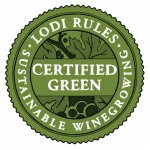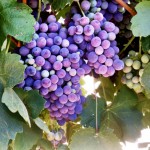Lodi Rules: Grow great grapes, make delicious wine, leave everything a little better than we found it
“May we farm in a way that meets the needs of today without compromising the ability of future generations to create their livelihoods.” – The LODI RULES motto.
Started in 2005, the LODI RULES certification program is a collective of growers who are focused on all thing’s sustainability. Many of these Lodi Farmers are 4th or 5th generation winegrowers who are focused on farming with the next 100 years in mind. We at Musto Wine Grape, are lucky enough to work with some of these amazing farmers – Mettler Ranch and Costamagna Vineyards. Look for the LODI RULES seal on the wine grape boxes this season.
LODI RULES growers use a unique risk model to quantify the environmental and human impact of all pesticides applied in the vineyard. This model considers the dietary risks to consumers, as well as the acute risk to farm workers; small aquatic invertebrates; birds; and bees; and bees and beneficial insects. The Lodi region has documented a great decline in the use of high-risk pesticides since 1992, thanks to sustainability adaption by farmers.
LODI RULES Sustainability Standards Overview:
- Water: They carefully manage the quality and efficiency of their water, appreciating every drop
- Soil: They do their part to make sure that soil – the foundation of the vineyard- thrives for generations to come
- Community: They support the neighborhoods and schools around the farms
- Ecosystem: They encourage biodiversity and act as stewards of the land
- Pest Management: They us an integrated approach to pest management, which includes protecting beneficial insects and minimizing risks to birds, bees, water, and people
- People: They make sure that their vineyards are a safe and rewarding place to work
- Quality: They design farming practices to improve wine grape quality
- Generational Farming: They farm with the next 100 years in mind
How is certified sustainable farming different than organic and biodynamic?
- Organic and biodynamic farmers follow a set of practices related to the environment. Certified sustainable farming includes practices related to the environment, the people, and the business.
LODI RULES has over 100 sustainable practices included in its certification; with over 28,776 acres certified.
Over 150 wines bear the LR seal (Mettler Ranch & Costamagna being some of them!) A wine must contain 85% certified grapes to be the LR seal.
“Sustainability means leaving everything – people, places, etc.- as good as better than how we found it” – Kevin Philips, Michael David Winery
“When you drink a glass of wine made from LODI RULES certified grapes, you are supporting a farmer, a vintner, and an entire agricultural community that embraces their responsibility to care for the environment and the people”
This is a certification I think we can all get behind. Musto Wine Grape is grateful to be bringing in these grapes this season. If you are interested in grapes from the LODI RULES program, please give us a call at 877-812-1137 to pre-order. We are looking forward to assisting with your winemaking this fall!
Grapes Available from LODI RULES Certified Vineyards:
Mettler Ranch:
- Barbera
- Cabernet Sauvignon
- Grenache
- Merlot
- Pinot Grigio
- Pinotage
- Petite Sirah
- Rousanne
- Sangivoese
- Syrah
- Viognier
- Zinfandel
Costamagna Vineyards:
- Old Vine Primitivo
- Cabernet
- Merlot
- Sangiovese
- Barbera
- Aglianico
- Montelpulciano
- Mourvedre
- Nero D’Avola
- Sagrantino
Cheers,
Christina Musto-Quick








Recent Comments